Unit 10 You’re supposed to shake hands 单元导学案+同步练习(无答案)
文档属性
| 名称 | Unit 10 You’re supposed to shake hands 单元导学案+同步练习(无答案) | 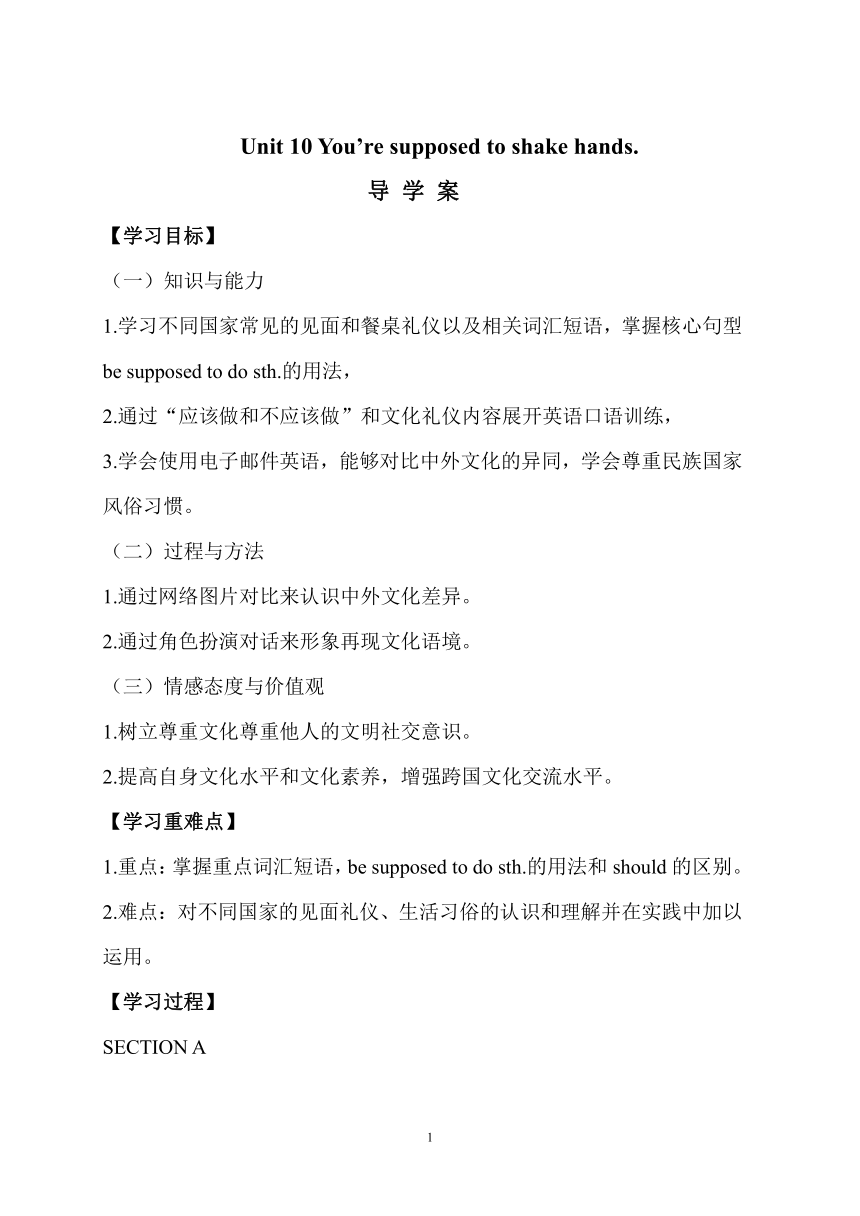 | |
| 格式 | zip | ||
| 文件大小 | 21.7KB | ||
| 资源类型 | 教案 | ||
| 版本资源 | 人教新目标(Go for it)版 | ||
| 科目 | 英语 | ||
| 更新时间 | 2020-01-10 18:23:47 | ||
图片预览

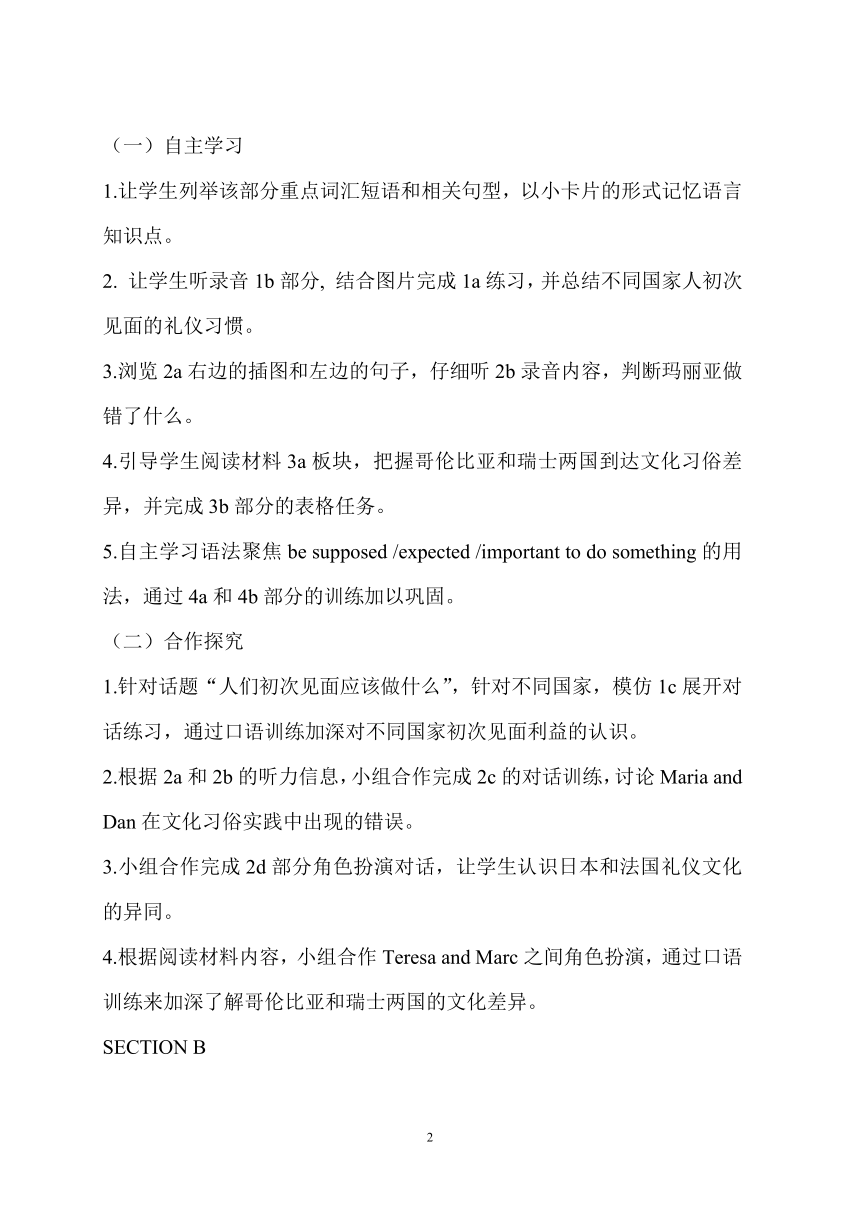
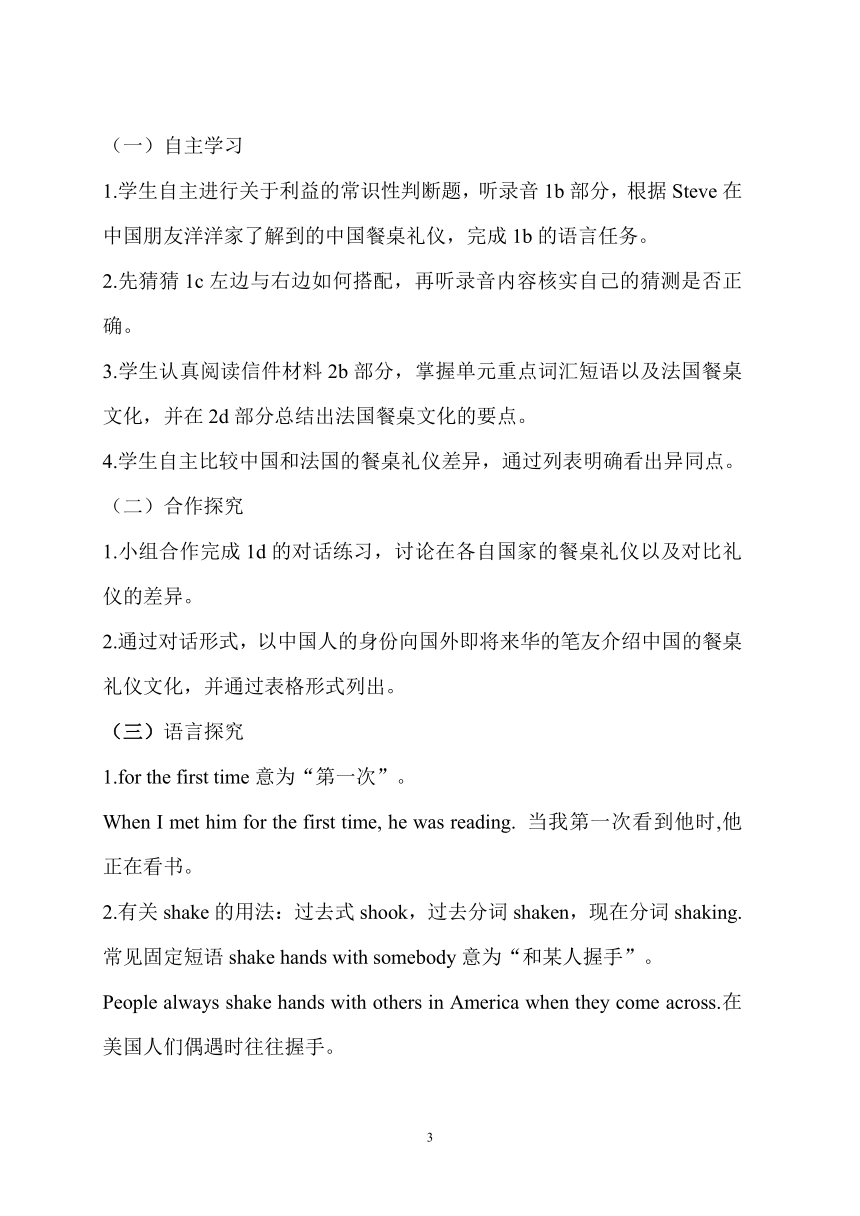
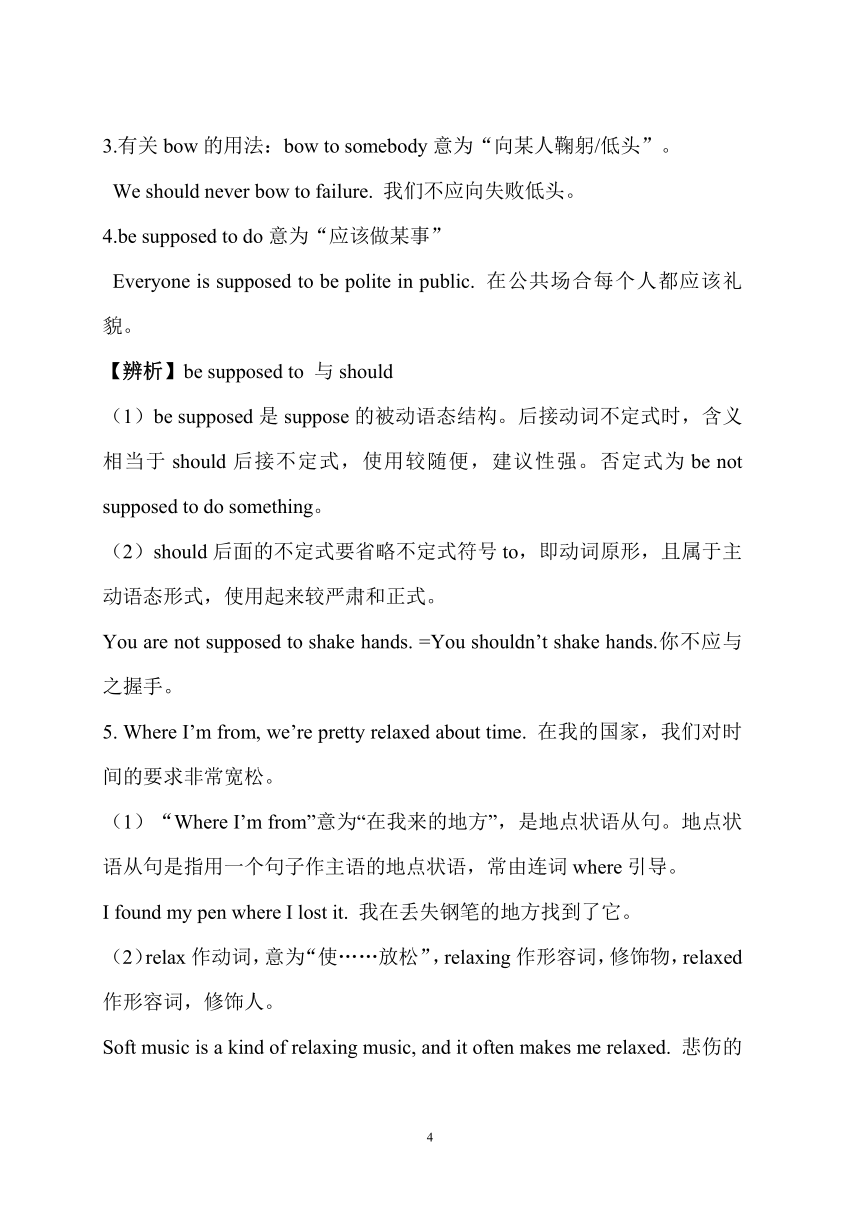
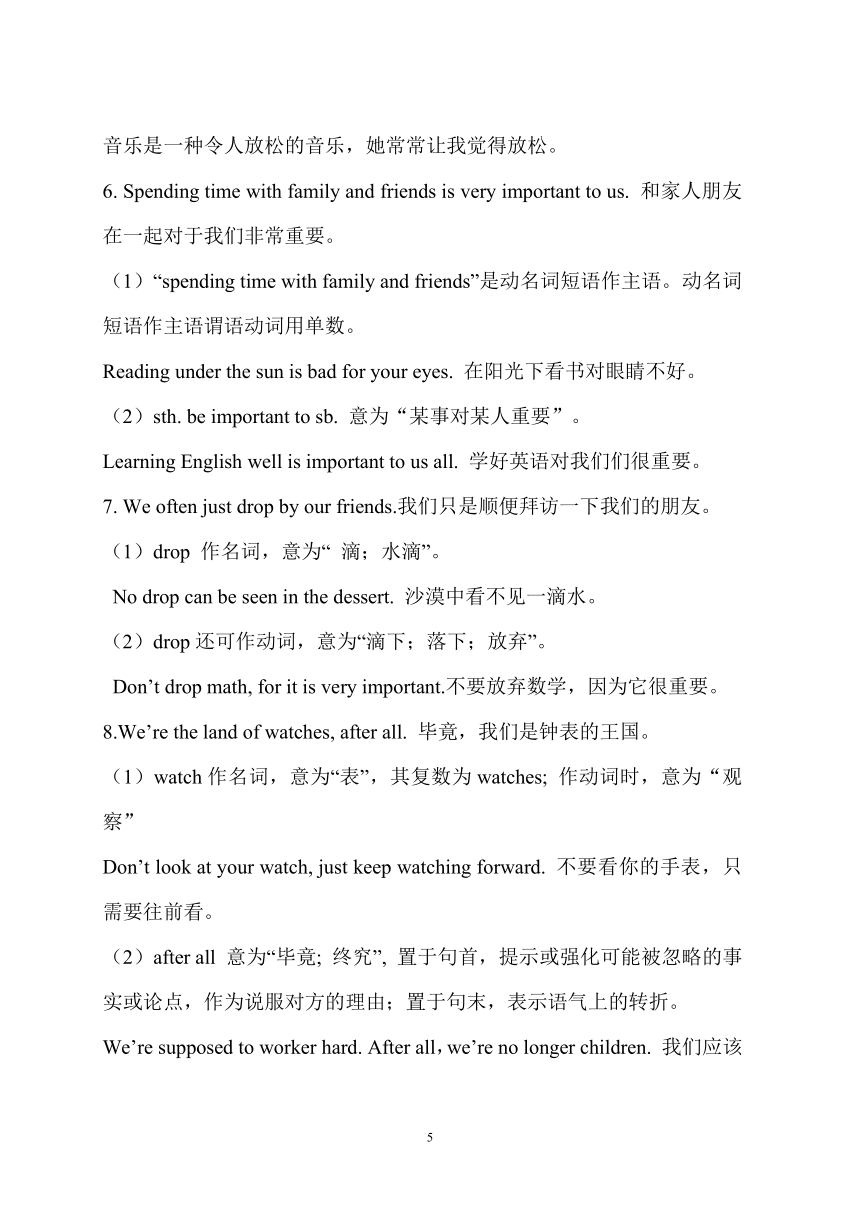
文档简介
Unit 10 You’re supposed to shake hands.
导 学 案
【学习目标】
(一)知识与能力
1.学习不同国家常见的见面和餐桌礼仪以及相关词汇短语,掌握核心句型be supposed to do sth.的用法,
2.通过“应该做和不应该做”和文化礼仪内容展开英语口语训练,
3.学会使用电子邮件英语,能够对比中外文化的异同,学会尊重民族国家风俗习惯。
(二)过程与方法
1.通过网络图片对比来认识中外文化差异。
2.通过角色扮演对话来形象再现文化语境。
(三)情感态度与价值观
1.树立尊重文化尊重他人的文明社交意识。
2.提高自身文化水平和文化素养,增强跨国文化交流水平。
【学习重难点】
1.重点:掌握重点词汇短语,be supposed to do sth.的用法和should的区别。
2.难点:对不同国家的见面礼仪、生活习俗的认识和理解并在实践中加以运用。
【学习过程】
SECTION A
(一)自主学习
1.让学生列举该部分重点词汇短语和相关句型,以小卡片的形式记忆语言知识点。
2. 让学生听录音1b部分, 结合图片完成1a练习,并总结不同国家人初次见面的礼仪习惯。
3.浏览2a右边的插图和左边的句子,仔细听2b录音内容,判断玛丽亚做错了什么。
4.引导学生阅读材料3a板块,把握哥伦比亚和瑞士两国到达文化习俗差异,并完成3b部分的表格任务。
5.自主学习语法聚焦be supposed /expected /important to do something的用法,通过4a和4b部分的训练加以巩固。
(二)合作探究
1.针对话题“人们初次见面应该做什么”,针对不同国家,模仿1c展开对话练习,通过口语训练加深对不同国家初次见面利益的认识。
2.根据2a和2b的听力信息,小组合作完成2c的对话训练,讨论Maria and Dan在文化习俗实践中出现的错误。
3.小组合作完成2d部分角色扮演对话,让学生认识日本和法国礼仪文化的异同。
4.根据阅读材料内容,小组合作Teresa and Marc之间角色扮演,通过口语训练来加深了解哥伦比亚和瑞士两国的文化差异。
SECTION B
(一)自主学习
1.学生自主进行关于利益的常识性判断题,听录音1b部分,根据Steve在中国朋友洋洋家了解到的中国餐桌礼仪,完成1b的语言任务。
2.先猜猜1c左边与右边如何搭配,再听录音内容核实自己的猜测是否正确。
3.学生认真阅读信件材料2b部分,掌握单元重点词汇短语以及法国餐桌文化,并在2d部分总结出法国餐桌文化的要点。
4.学生自主比较中国和法国的餐桌礼仪差异,通过列表明确看出异同点。
(二)合作探究
1.小组合作完成1d的对话练习,讨论在各自国家的餐桌礼仪以及对比礼仪的差异。
2.通过对话形式,以中国人的身份向国外即将来华的笔友介绍中国的餐桌礼仪文化,并通过表格形式列出。
(三)语言探究
1.for the first time意为“第一次”。
When I met him for the first time, he was reading. 当我第一次看到他时,他正在看书。
2.有关shake的用法:过去式shook,过去分词shaken,现在分词shaking. 常见固定短语shake hands with somebody意为“和某人握手”。
People always shake hands with others in America when they come across.在美国人们偶遇时往往握手。
3.有关bow的用法:bow to somebody意为“向某人鞠躬/低头”。
We should never bow to failure. 我们不应向失败低头。
4.be supposed to do意为“应该做某事”
Everyone is supposed to be polite in public. 在公共场合每个人都应该礼貌。
【辨析】be supposed to 与should
(1)be supposed是suppose的被动语态结构。后接动词不定式时,含义相当于should后接不定式,使用较随便,建议性强。否定式为be not supposed to do something。
(2)should后面的不定式要省略不定式符号to,即动词原形,且属于主动语态形式,使用起来较严肃和正式。
You are not supposed to shake hands. =You shouldn’t shake hands.你不应与之握手。
5. Where I’m from, we’re pretty relaxed about time. 在我的国家,我们对时间的要求非常宽松。
(1)“Where I’m from”意为“在我来的地方”,是地点状语从句。地点状语从句是指用一个句子作主语的地点状语,常由连词where引导。
I found my pen where I lost it. 我在丢失钢笔的地方找到了它。
(2)relax作动词,意为“使……放松”,relaxing作形容词,修饰物,relaxed作形容词,修饰人。
Soft music is a kind of relaxing music, and it often makes me relaxed. 悲伤的音乐是一种令人放松的音乐,她常常让我觉得放松。
6. Spending time with family and friends is very important to us. 和家人朋友在一起对于我们非常重要。
(1)“spending time with family and friends”是动名词短语作主语。动名词短语作主语谓语动词用单数。
Reading under the sun is bad for your eyes. 在阳光下看书对眼睛不好。
(2)sth. be important to sb. 意为“某事对某人重要”。
Learning English well is important to us all. 学好英语对我们们很重要。
7. We often just drop by our friends.我们只是顺便拜访一下我们的朋友。
(1)drop 作名词,意为“ 滴;水滴”。
No drop can be seen in the dessert. 沙漠中看不见一滴水。
(2)drop还可作动词,意为“滴下;落下;放弃”。
Don’t drop math, for it is very important.不要放弃数学,因为它很重要。
8.We’re the land of watches, after all. 毕竟,我们是钟表的王国。
(1)watch作名词,意为“表”,其复数为watches; 作动词时,意为“观察”
Don’t look at your watch, just keep watching forward. 不要看你的手表,只需要往前看。
(2)after all 意为“毕竟; 终究”, 置于句首,提示或强化可能被忽略的事实或论点,作为说服对方的理由;置于句末,表示语气上的转折。
We’re supposed to worker hard. After all,we’re no longer children. 我们应该努力学习,毕竟我们不再是孩子了。
9. In China, you’re not supposed to pick up your bowl to eat. 在中国,你不应该端着碗吃饭。
pick 是动词,意为“拾取;挑选;采摘”。pick up 意为“捡起;拾起”。
The girls are picking apples on the farm. 姑娘们正在农场摘苹果。
He picked up a wallet on the way to school. 他在上学的路上捡到了一个钱包。
10.You shouldn’t point at anyone with your chopsticks. 你不应该用筷子指着任何人。
【辨析】point at, point to与point out
(1)point意为“指着;指向”,在用事物名词作主语时,一般和point to连用,在用人物名词作主语时,常用point at。
Our teacher is pointing at the map on the wall.我们的老师在指着墙上的地图。
The hand of the clock point six.时钟的针指向六。
(2)point at可以分开来理解,也就是point后直接跟名词或代词作宾语,at表示方向,point to没有这种用法。
(3)point out意为“指出“,属于“动副”结构的短语,虽可跟宾语,但若是代词,须放point和out之间。
Can you point out the church in this picture? 你能指出这张图画中的教堂吗?
10. It’s even better than I thought it would be. 它甚至比我想象的好得多。
(1)even是程度副词,意为“甚至;更”,用来修饰比较级。
(2)better是good or well的比较级,最高级为best。
11. I was a bit nervous before I arrived here…在我到这儿之前有点紧张。
【辨析】a bit, a little与 a few
(1)a bit意为“有点;稍许”,可用作程度状语修饰形容词或副词,也可修饰不可数名词,形式为a bit of +不可数名词。
(2)a little意为 “一点;少量”,用作程度状语修饰形容词或副词,与a bit 相同,也可直接修饰不可数名词,即a little +不可数名词。
(3)a few意为 “一些;几个”,用于修饰可数名词的复数,即a few+复数名词。little, few表示否定,表示“几乎没有”之意。
12. You’re not supposed to eat anything with your hands except bread. 除了面包,你可以用手吃任何东西。
except 作介词时,意为“除……之外”,表示把某一部分从整体中排除在外,后接名词、代词等。besides 作介词时,意为“除……以外还有”,常表示包括被除去的对象在内。
We go to school except Saturday and Sunday. 除了星期六和星期天,我们每天都去上学。
We all succeed besides Tom. 除了汤姆成功外,我们也都成功了。
13. I find it difficult to remember everything. 我发现很难记住所有的事情。
该句结构为“主语+find it +adj.+to do sth.”, 意为 “发现做某事怎么样”。其中it 是形式主语,adj.是宾语补足语,to do sth.是真正的主语。此结构可转换为 “主语+find that it be +adj. + to do sth.”.
We find it easy to learn swimming. =We find that it is easy to learn English. 我们发现学习英语很简单。
14. 有关unfamiliar的用法:作形容词,意思为“不熟悉的;没有见过或听过的”,其同义为strange,其反义词为similar。
【拓展】(1)be unfamiliar to…意为“不深知的;生疏的”。
I am unfamiliar with their music .我没听过他们的音乐。
(2)be unfamiliar with…表示“没听过; 没听见; 不熟悉的”。
That face is unfamiliar with me.那副面孔我很生疏。
15.【辨析】most, mostly与the most
(1)most可修饰动词,意为“最;第一” 。most常可作very用,修饰kind, helpful, grateful, beautiful等表示主观感觉的形容词和副词。这时不表示比较,不能和the连用。most作代词用,意为“大多数的;最多的;最大的”,可与介词of 连用。most 作形容词用,意思是“大半的;大多数的”,直接修饰名词。
(2)mostly为副词,意为“大体上;大部分”。
(3)the most意为“最大数量,最大限度”。
16. can’t stop doing sth. 意为“禁不住做某事”。can’t stop 后面跟动名词。
The baby couldn’t see her mother. She couldn’t stop crying. 小孩没有看见妈妈,禁不住哭起来了。
【拓展延伸】
1.the +序数词+time表示第几次,the second time意为“第二次”。
2.有关时间的短语:on time“准时”;at one time“曾经”。
3.suppose作动词,意为“假定”;supposed作形容词,意为“假设的”。
4.should还可意为“竟然”,表示惊讶的语气。
5. relax的名词形式为relief, 其常用固定短语为to one’s relief。
6. spend time on doing something意为“花费时间做某事”。
7.drop by相当于drop in on somebody or drop in at some place, 意为“顺道拜访某人某地”。
8. pick up还可以为“搭载某人;顺便学到”。
9. not a little意为“非常”;not a bit意为“一点也不”。
10.be in no exception意为“也不例外”。
【课堂检测】
一、根据句意及汉语提示完成句子
1.In Japan, people are supposed to _________(鞠躬) when they meet for the first time.
2.It’s?polite?____________(亲吻)?the?others?in?public?in?America.
3.We should never be afraid of ___________(犯错误).
4.When we meet Americans for the first time, we should _________(握手)with them.
5.You?must?know?some?__________(风俗)before you go to some foreign countries.
6. In China, you’re not supposed to ____________(拾取) your bowl to eat.
7. In Brazil, you should wipe your mouth with your napkin ___________(每次)you take a drink.
8. It’s polite to _________(发出噪音) while eating noodles.
9. You shouldn’t _____________(指着) anyone with your chopsticks.
10. We’re the land of watches, ______________(毕竟)。
二、用所给词的适当形式填空
1. You can find some _________(rule) about time in England.
2. We should never visit a friend’s house without _______(call ) first.
3._____(spend) time with family and friends is necessary to us.
4. When you are _______(invite), you should arrive on time.
5. We must find places _________(study).
E-mail English is a new kind of _______(write) English that is being used ______(save) time.
______(use) e-mail English _______(help) you write quickly.
E-mail English _______(most) use two types of words.
One ________(Canada) teacher says “People can use their computers to talk each other.”
E-mail English is fun. You can learn it _______(easy) by yourselves.
【巩固练习】
1. We often ______our friends’ homes at weekends.
A. drop around B. drop off C. drop down D. drop by
2. She often makes plans ____others.
A. helps B. helping C. to help D. help
3. Do you think ____useful to learn a foreign language?
A. hat B. it C. this D. they
4. This interesting book only ______ me ten yuan and I _______ ten month reading it.
A. cost, spend B. cost, spent C. spends, cost D. spent, costs
5.. Everyone went to the zoo _______ Jim yesterday. He was ill.
A. with B. except C. except for D. besides
6. Jim’s father is used to _______ in China.
A. working B. work C. works D. worked
7. We go to school every day _____ Saturday and Sunday.
A. beside B. besides C. except D. except for
8. He _____ in his English Test Paper. His teacher was very angry with him.
A. makes some mistakes B. make a mistake
C. made few mistakes D. made many mistakes
9. You should here at 7:00 this morning, but you arrived at 8:00.You were late.
A. have arrived B. arrived C. arrive D. had got
10. Last weekend many people went to Jenny’s concert, young people.
A. hardly B. probably C. mostly D. really
导 学 案
【学习目标】
(一)知识与能力
1.学习不同国家常见的见面和餐桌礼仪以及相关词汇短语,掌握核心句型be supposed to do sth.的用法,
2.通过“应该做和不应该做”和文化礼仪内容展开英语口语训练,
3.学会使用电子邮件英语,能够对比中外文化的异同,学会尊重民族国家风俗习惯。
(二)过程与方法
1.通过网络图片对比来认识中外文化差异。
2.通过角色扮演对话来形象再现文化语境。
(三)情感态度与价值观
1.树立尊重文化尊重他人的文明社交意识。
2.提高自身文化水平和文化素养,增强跨国文化交流水平。
【学习重难点】
1.重点:掌握重点词汇短语,be supposed to do sth.的用法和should的区别。
2.难点:对不同国家的见面礼仪、生活习俗的认识和理解并在实践中加以运用。
【学习过程】
SECTION A
(一)自主学习
1.让学生列举该部分重点词汇短语和相关句型,以小卡片的形式记忆语言知识点。
2. 让学生听录音1b部分, 结合图片完成1a练习,并总结不同国家人初次见面的礼仪习惯。
3.浏览2a右边的插图和左边的句子,仔细听2b录音内容,判断玛丽亚做错了什么。
4.引导学生阅读材料3a板块,把握哥伦比亚和瑞士两国到达文化习俗差异,并完成3b部分的表格任务。
5.自主学习语法聚焦be supposed /expected /important to do something的用法,通过4a和4b部分的训练加以巩固。
(二)合作探究
1.针对话题“人们初次见面应该做什么”,针对不同国家,模仿1c展开对话练习,通过口语训练加深对不同国家初次见面利益的认识。
2.根据2a和2b的听力信息,小组合作完成2c的对话训练,讨论Maria and Dan在文化习俗实践中出现的错误。
3.小组合作完成2d部分角色扮演对话,让学生认识日本和法国礼仪文化的异同。
4.根据阅读材料内容,小组合作Teresa and Marc之间角色扮演,通过口语训练来加深了解哥伦比亚和瑞士两国的文化差异。
SECTION B
(一)自主学习
1.学生自主进行关于利益的常识性判断题,听录音1b部分,根据Steve在中国朋友洋洋家了解到的中国餐桌礼仪,完成1b的语言任务。
2.先猜猜1c左边与右边如何搭配,再听录音内容核实自己的猜测是否正确。
3.学生认真阅读信件材料2b部分,掌握单元重点词汇短语以及法国餐桌文化,并在2d部分总结出法国餐桌文化的要点。
4.学生自主比较中国和法国的餐桌礼仪差异,通过列表明确看出异同点。
(二)合作探究
1.小组合作完成1d的对话练习,讨论在各自国家的餐桌礼仪以及对比礼仪的差异。
2.通过对话形式,以中国人的身份向国外即将来华的笔友介绍中国的餐桌礼仪文化,并通过表格形式列出。
(三)语言探究
1.for the first time意为“第一次”。
When I met him for the first time, he was reading. 当我第一次看到他时,他正在看书。
2.有关shake的用法:过去式shook,过去分词shaken,现在分词shaking. 常见固定短语shake hands with somebody意为“和某人握手”。
People always shake hands with others in America when they come across.在美国人们偶遇时往往握手。
3.有关bow的用法:bow to somebody意为“向某人鞠躬/低头”。
We should never bow to failure. 我们不应向失败低头。
4.be supposed to do意为“应该做某事”
Everyone is supposed to be polite in public. 在公共场合每个人都应该礼貌。
【辨析】be supposed to 与should
(1)be supposed是suppose的被动语态结构。后接动词不定式时,含义相当于should后接不定式,使用较随便,建议性强。否定式为be not supposed to do something。
(2)should后面的不定式要省略不定式符号to,即动词原形,且属于主动语态形式,使用起来较严肃和正式。
You are not supposed to shake hands. =You shouldn’t shake hands.你不应与之握手。
5. Where I’m from, we’re pretty relaxed about time. 在我的国家,我们对时间的要求非常宽松。
(1)“Where I’m from”意为“在我来的地方”,是地点状语从句。地点状语从句是指用一个句子作主语的地点状语,常由连词where引导。
I found my pen where I lost it. 我在丢失钢笔的地方找到了它。
(2)relax作动词,意为“使……放松”,relaxing作形容词,修饰物,relaxed作形容词,修饰人。
Soft music is a kind of relaxing music, and it often makes me relaxed. 悲伤的音乐是一种令人放松的音乐,她常常让我觉得放松。
6. Spending time with family and friends is very important to us. 和家人朋友在一起对于我们非常重要。
(1)“spending time with family and friends”是动名词短语作主语。动名词短语作主语谓语动词用单数。
Reading under the sun is bad for your eyes. 在阳光下看书对眼睛不好。
(2)sth. be important to sb. 意为“某事对某人重要”。
Learning English well is important to us all. 学好英语对我们们很重要。
7. We often just drop by our friends.我们只是顺便拜访一下我们的朋友。
(1)drop 作名词,意为“ 滴;水滴”。
No drop can be seen in the dessert. 沙漠中看不见一滴水。
(2)drop还可作动词,意为“滴下;落下;放弃”。
Don’t drop math, for it is very important.不要放弃数学,因为它很重要。
8.We’re the land of watches, after all. 毕竟,我们是钟表的王国。
(1)watch作名词,意为“表”,其复数为watches; 作动词时,意为“观察”
Don’t look at your watch, just keep watching forward. 不要看你的手表,只需要往前看。
(2)after all 意为“毕竟; 终究”, 置于句首,提示或强化可能被忽略的事实或论点,作为说服对方的理由;置于句末,表示语气上的转折。
We’re supposed to worker hard. After all,we’re no longer children. 我们应该努力学习,毕竟我们不再是孩子了。
9. In China, you’re not supposed to pick up your bowl to eat. 在中国,你不应该端着碗吃饭。
pick 是动词,意为“拾取;挑选;采摘”。pick up 意为“捡起;拾起”。
The girls are picking apples on the farm. 姑娘们正在农场摘苹果。
He picked up a wallet on the way to school. 他在上学的路上捡到了一个钱包。
10.You shouldn’t point at anyone with your chopsticks. 你不应该用筷子指着任何人。
【辨析】point at, point to与point out
(1)point意为“指着;指向”,在用事物名词作主语时,一般和point to连用,在用人物名词作主语时,常用point at。
Our teacher is pointing at the map on the wall.我们的老师在指着墙上的地图。
The hand of the clock point six.时钟的针指向六。
(2)point at可以分开来理解,也就是point后直接跟名词或代词作宾语,at表示方向,point to没有这种用法。
(3)point out意为“指出“,属于“动副”结构的短语,虽可跟宾语,但若是代词,须放point和out之间。
Can you point out the church in this picture? 你能指出这张图画中的教堂吗?
10. It’s even better than I thought it would be. 它甚至比我想象的好得多。
(1)even是程度副词,意为“甚至;更”,用来修饰比较级。
(2)better是good or well的比较级,最高级为best。
11. I was a bit nervous before I arrived here…在我到这儿之前有点紧张。
【辨析】a bit, a little与 a few
(1)a bit意为“有点;稍许”,可用作程度状语修饰形容词或副词,也可修饰不可数名词,形式为a bit of +不可数名词。
(2)a little意为 “一点;少量”,用作程度状语修饰形容词或副词,与a bit 相同,也可直接修饰不可数名词,即a little +不可数名词。
(3)a few意为 “一些;几个”,用于修饰可数名词的复数,即a few+复数名词。little, few表示否定,表示“几乎没有”之意。
12. You’re not supposed to eat anything with your hands except bread. 除了面包,你可以用手吃任何东西。
except 作介词时,意为“除……之外”,表示把某一部分从整体中排除在外,后接名词、代词等。besides 作介词时,意为“除……以外还有”,常表示包括被除去的对象在内。
We go to school except Saturday and Sunday. 除了星期六和星期天,我们每天都去上学。
We all succeed besides Tom. 除了汤姆成功外,我们也都成功了。
13. I find it difficult to remember everything. 我发现很难记住所有的事情。
该句结构为“主语+find it +adj.+to do sth.”, 意为 “发现做某事怎么样”。其中it 是形式主语,adj.是宾语补足语,to do sth.是真正的主语。此结构可转换为 “主语+find that it be +adj. + to do sth.”.
We find it easy to learn swimming. =We find that it is easy to learn English. 我们发现学习英语很简单。
14. 有关unfamiliar的用法:作形容词,意思为“不熟悉的;没有见过或听过的”,其同义为strange,其反义词为similar。
【拓展】(1)be unfamiliar to…意为“不深知的;生疏的”。
I am unfamiliar with their music .我没听过他们的音乐。
(2)be unfamiliar with…表示“没听过; 没听见; 不熟悉的”。
That face is unfamiliar with me.那副面孔我很生疏。
15.【辨析】most, mostly与the most
(1)most可修饰动词,意为“最;第一” 。most常可作very用,修饰kind, helpful, grateful, beautiful等表示主观感觉的形容词和副词。这时不表示比较,不能和the连用。most作代词用,意为“大多数的;最多的;最大的”,可与介词of 连用。most 作形容词用,意思是“大半的;大多数的”,直接修饰名词。
(2)mostly为副词,意为“大体上;大部分”。
(3)the most意为“最大数量,最大限度”。
16. can’t stop doing sth. 意为“禁不住做某事”。can’t stop 后面跟动名词。
The baby couldn’t see her mother. She couldn’t stop crying. 小孩没有看见妈妈,禁不住哭起来了。
【拓展延伸】
1.the +序数词+time表示第几次,the second time意为“第二次”。
2.有关时间的短语:on time“准时”;at one time“曾经”。
3.suppose作动词,意为“假定”;supposed作形容词,意为“假设的”。
4.should还可意为“竟然”,表示惊讶的语气。
5. relax的名词形式为relief, 其常用固定短语为to one’s relief。
6. spend time on doing something意为“花费时间做某事”。
7.drop by相当于drop in on somebody or drop in at some place, 意为“顺道拜访某人某地”。
8. pick up还可以为“搭载某人;顺便学到”。
9. not a little意为“非常”;not a bit意为“一点也不”。
10.be in no exception意为“也不例外”。
【课堂检测】
一、根据句意及汉语提示完成句子
1.In Japan, people are supposed to _________(鞠躬) when they meet for the first time.
2.It’s?polite?____________(亲吻)?the?others?in?public?in?America.
3.We should never be afraid of ___________(犯错误).
4.When we meet Americans for the first time, we should _________(握手)with them.
5.You?must?know?some?__________(风俗)before you go to some foreign countries.
6. In China, you’re not supposed to ____________(拾取) your bowl to eat.
7. In Brazil, you should wipe your mouth with your napkin ___________(每次)you take a drink.
8. It’s polite to _________(发出噪音) while eating noodles.
9. You shouldn’t _____________(指着) anyone with your chopsticks.
10. We’re the land of watches, ______________(毕竟)。
二、用所给词的适当形式填空
1. You can find some _________(rule) about time in England.
2. We should never visit a friend’s house without _______(call ) first.
3._____(spend) time with family and friends is necessary to us.
4. When you are _______(invite), you should arrive on time.
5. We must find places _________(study).
E-mail English is a new kind of _______(write) English that is being used ______(save) time.
______(use) e-mail English _______(help) you write quickly.
E-mail English _______(most) use two types of words.
One ________(Canada) teacher says “People can use their computers to talk each other.”
E-mail English is fun. You can learn it _______(easy) by yourselves.
【巩固练习】
1. We often ______our friends’ homes at weekends.
A. drop around B. drop off C. drop down D. drop by
2. She often makes plans ____others.
A. helps B. helping C. to help D. help
3. Do you think ____useful to learn a foreign language?
A. hat B. it C. this D. they
4. This interesting book only ______ me ten yuan and I _______ ten month reading it.
A. cost, spend B. cost, spent C. spends, cost D. spent, costs
5.. Everyone went to the zoo _______ Jim yesterday. He was ill.
A. with B. except C. except for D. besides
6. Jim’s father is used to _______ in China.
A. working B. work C. works D. worked
7. We go to school every day _____ Saturday and Sunday.
A. beside B. besides C. except D. except for
8. He _____ in his English Test Paper. His teacher was very angry with him.
A. makes some mistakes B. make a mistake
C. made few mistakes D. made many mistakes
9. You should here at 7:00 this morning, but you arrived at 8:00.You were late.
A. have arrived B. arrived C. arrive D. had got
10. Last weekend many people went to Jenny’s concert, young people.
A. hardly B. probably C. mostly D. really
同课章节目录
- Unit 1 How can we become good learners.
- Section A
- Section B
- Unit 2 I think that mooncakes are delicious!
- Section A
- Section B
- Unit 3 Could you please tell me where the restroom
- Section A
- Section B
- Unit 4 I used to be afraid of the dark.
- Section A
- Section B
- Unit 5 What are the shirts made of?
- Section A
- Section B
- Review of Units 1-5
- Unit 6 When was it invented?
- Section A
- Section B
- Unit 7 Teenagers should be allowed to choose their
- Section A
- Section B
- Unit 8 It must belong to Carla.
- Section A
- Section B
- Unit 9 I like music that I can dance to.
- Section A
- Section B
- Unit 10 You're supposed to shake hands.
- Section A
- Section B
- Review of Units 6-10
- Unit 11 Sad movies make me cry.
- Section A
- Section B
- Unit 12 Life is full of the unexpected
- Section A
- Section B
- Unit 13 We're trying to save the earth!
- Section A
- Section B
- Unit 14 I remember meeting all of you in Grade 7.
- Section A
- Section B
- Review of Units 11-14
